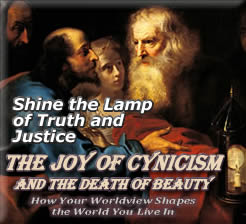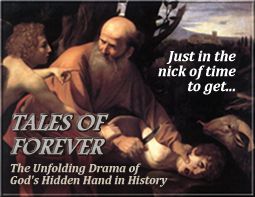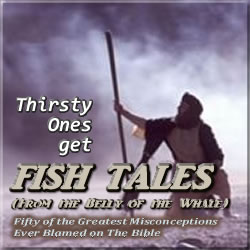His Line Will Continue Forever (Cont’d)
God Isn’t a Man That He Lies
Even a heathen soothsayer like Balaam knew it was useless to argue with God. How ironic, then, that while many evangelical Christians have more in common with agnostics like Thomas Paine, the Scriptures have Balaam declaring:
God isn’t a man that He lies, or a son of man that He changes His mind. Does He speak and not act? Does He promise and not fulfill?”1
What’s more, it should interest us to learn that while The Bible records just four prophetic utterances of Balaam—or oracles, as scholars call them—he had some very pertinent things to say in regard to our present inquiry. More importantly, what he said is all the more poignant considering these oracles weren’t spoken by an Israelite prophet but, rather, a heathen soothsayer.
In Balaam, then, we have another example of a walking, talking paradox so commonplace in the scriptural record. And while this should force us to pay attention to what he said, all too often his prophetic wisdom is taken for granted. In light of the overall scheme of things depicted in this work, though, it shouldn’t be difficult to push past such traditional blinders.
So, let’s see what Balaam said, some of which has immediate application, while some of it will shed light on future aspects of our investigation. For the sake of cutting to the chase, let’s condense Balaam’s story as follows:
Balak, son of Zippor, who was king of Moab at that time, summoned Balaam, son of Beor, who was at Pethor, near the Euphrates River, in his native land.
And Balak said to Balaam, “A people have come out of Egypt; they cover the face of the land and have settled next to me. Now come and put a curse on these people, because they are too powerful for me. Perhaps then I’ll be able to defeat them and drive them out of the land. For I know that whoever you bless is blessed, and whoever you curse is cursed…”
Story Continues Below
To watch author and historian W. Kent Smith discuss the contents of his book On Earth as It is On Heaven, at the Sacred Word Revealed Conference ’23, hosted by Zen Garcia, CLICK BELOW.
Story Continues From Above
Then Balaam took up a parable, and said, “Balak, the king of Moab, brought me from Aram, out of the mountains of the east, saying, ‘Come, curse Jacob, and come, defy Israel.’
“But how can I curse whom God hasn’t cursed? Or how can I defy whom the Lord hasn’t defied?
“For from the hills I look upon him: See, the people dwell alone, and won’t be reckoned among the nations.
“Who can count the dust of Jacob, and the number of the fourth part of Israel?”2
How interesting is that? While theologians and scholars down through the ages have heatedly debated whether Balaam was rightly or wrongly included in the scriptural record, he somehow saw what few could’ve known at that time. What Balak could only see with the eyes in his head, Balaam saw with his inward eyes. Balak saw the mass of people invading his land, while Balaam, speaking in a day with neither printing press nor social media, had the foresight to echo the very words that God intimately spoke to Abraham as recorded in Genesis: “Your descendants will be like the dust of the Earth.”
And that’s not all. Listen to what else Balaam said about the emerging new nation of Israel—in direct defiance of Balak’s demands—just beginning to make its presence known to the inhabitants of Palestine:
Look and see, I’ve received commandment to bless; and so He’s blessed. I can’t reverse it!
He hasn’t found iniquity in Jacob, neither has He seen perverseness in Israel. The Lord his God is with him, and the shout of a king is among them!
God brought them out of Egypt; he has, as it were, the strength of a wild ox.
Certainly there’s no enchantment against Jacob, neither is there any divination against Israel. Speaking of this time one day, it will be said of Jacob and of Israel, “What has God wrought!”
See, the people will rise up as a great lion, and lift up himself as a young lion; he won’t lie down until he eats his prey, and drinks the blood of the slain…
How lovely are your tents, oh Jacob, and your tabernacles, oh Israel! Like valleys they spread out, like gardens beside a river, like aloes planted by the Lord, like cedars beside the waters.
He will pour the water out of his buckets, and his seed will be in many waters, and his king will be higher than Agag, and his kingdom will be exalted.
God brought him forth out of Egypt; he has, as it were, the strength of a wild ox. He’ll eat up the nations his enemies, and will break their bones, and pierce them through with his arrows.
He couched, he lay down as a lion, and as a great lion; who shall stir him up? Blessed is he that blesses you, and cursed is he that curses you.3
Descendants like dust, revealed first to Abraham, and then, as we’ll see in a moment, to his grandson Jacob, is here confirmed in the words of the most unlikely source one could expect. But notice please several other key points that Balaam tunes in on. “The Lord his God is with him,” said Balaam, “and the shout of the king is among them!” But not just any shout, actually, because according to the meaning conveyed in the Hebrew, this shout is the shout of alarm, the shout of war! But fear not, oh Israel, according to Balaam nothing will deter them in battle—no enchantment, no divination. On this point, Scripture is clear.
However, what’s unclear is the real reason for Balaam’s repetition concerning Jacob’s exodus from Egypt, when he describes their strength as being like both a wild ox and a lion, and that they’ll eat up enemy nations, break their bones, pierce them with arrows, and drink their blood. Why do I say unclear?
I say that because most assume when Balaam twice said that God brought Jacob out of Egypt, followed by all they’d do afterwards through divine strength, he was repeating himself like many Hebrew poetic utterances repeat themselves. But I’d suggest that by insisting on this, one misses out on a vast portion of hidden meaning in the prophetic words of this heathen soothsayer. And mind you, these are words which have so far been proven genuine despite the skeptics and critics who insist God’s word could never flow through such a one as Balaam.







